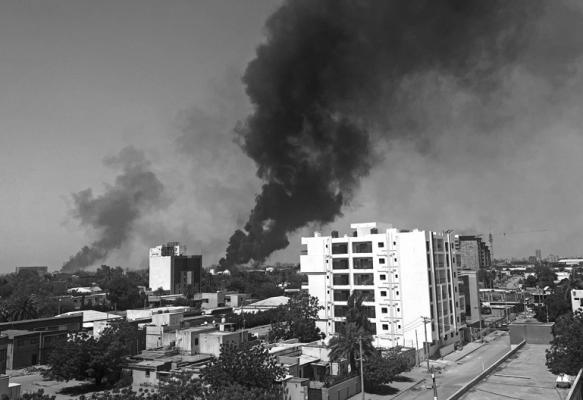Clashes rock Sudan capital as diplomats push for cease-fire
Gunfire and explosions rocked the Sudanese capital for a third day as diplomats intensified efforts to stop clashes between the army and a paramilitary group from escalating into a fullblown civil war.
The head of the African Union, Moussa Faki Mahamat, prepared to travel to Khartoum to try and negotiate an end to fighting that has reached “a dangerous level,” the continental body said in a statement. The violence has left at least 97 civilians dead, according to the Central Committee of Sudanese Doctors, a pro-democracy medical group.
Representatives from the United Arab Emirates, the UK, US and Saudi Arabia — a group known as the quad that tried to restore elements of civilian rule after a 2021 coup in the North African country — were also scrambling to stop the clashes by making calls to both parties, said western diplomats who asked not to be identified.
The conflict erupted on Saturday after a long-simmering dispute between the army and the Rapid Support Forces paramilitary group exploded into a battle for control of the nation. The two sides traded claims on holding key infrastructure such as the international airport in Khartoum and the public broadcaster.
The fighting between the army under Abdel Fattah al-Burhan and the RSF throws into chaos plans for a powersharing government that was supposed to lead Sudan to democratic elections after a 2021 coup. A deal was seen as a way to restore billions of dollars of frozen aid and was being closely monitored by Western powers and Russia and China, which covet its strategic Red Sea coastline, oil and mineral resources.
In addition to fighting in Khartoum, there have also been clashes in el-Fasher in the western region of Darfur over control of the airport. Further skirmishes took place in Blue Nile state near the border with Ethiopia and in Port Sudan, a key trading zone and crucial conduit for the export of oil from South Sudan.
U.S. Secretary of State Antony Blinken and UK Foreign Secretary James Cleverly, speaking together Monday at a Group of Seven foreign ministers’ meeting in Karuizawa, Japan, both called on the nation’s generals to stop fighting.
“People in Sudan, want the military back in the barracks,” Blinken said. “They want democracy. They want a civilian led government. Sudan needs to return to that path.”
Those calls echoed appeals by China and the United Nations Security Council for a cease-fire. The violence may put at risk state-owned China National Petroleum Corp.’s oil assets in Sudan, including a key stake in the main oil refinery in Khartoum, according to Bloomberg Intelligence.
“In addition to the risk of asset destruction is that of possible nationalization, though CNPC could navigate that, given its long presence in the region,” it said, though any loss would be “minuscule in the context of CNPC’s $650 billion balance sheet.”
Also in jeopardy is a $6 billion preliminary agreement that Sudan’s government signed with two firms from the United Arab Emirates in December to construct a new port on the Red Sea coast, Sudanese state media said.
The UAE has fostered ties with Sudan since it began mediating the nation’s political crisis following the coup that ousted Prime Minister Abdalla Hamdok in 2021. In February, Al-Burhan visited Abu Dhabi to discuss ways to reduce political tensions and drum up support for the country. The UAE, along with Saudi Arabia, have pledged billions of dollars in aid to shore up Sudan’s economy.
Although it lacks the military’s tanks and air power, the RSF is a seasoned fighting force notorious for its scorched-earth tactics that may field as many as 70,000 fighters, according to the International Crisis Group. That raises the prospect of an extended conflict that could also draw in Sudan’s neighbors.
The RSF has its origins in the janjaweed militias that terrorized Darfur during the conflict earlier this century. RSF leader Mohamed Hamdan Dagalo is thought to harbor his own presidential ambitions and has forged close ties with Russia in recent years. The Russian mercenary Wagner Group is involved in Sudan’s goldmining sector.
A key scenario that the international community is trying to avoid is the prospect of Sudan’s myriad militias and armed groups becoming embroiled in the conflict, said Arit Elsawi, co-founder of Sudan Facts, a nonprofit media organization based in Khartoum.
Groups such as the Justice and Equality Movement, whose leader Gibril Ibrahim is the current finance minister, the Sudanese Liberation Army and the Sudan People’s Liberation Movement all signed the so-called Juba Peace Agreement after the fall of the longtime dictator Omar al-Bashir in 2019. There’s is a chance they may now take sides, escalating the conflict.
“If the violence continues, they will not have a choice but to join the fight,” Elsawi said.
___ (With assistance from Iain Marlow, Zainab Fattah and Arijit Ghosh.)


